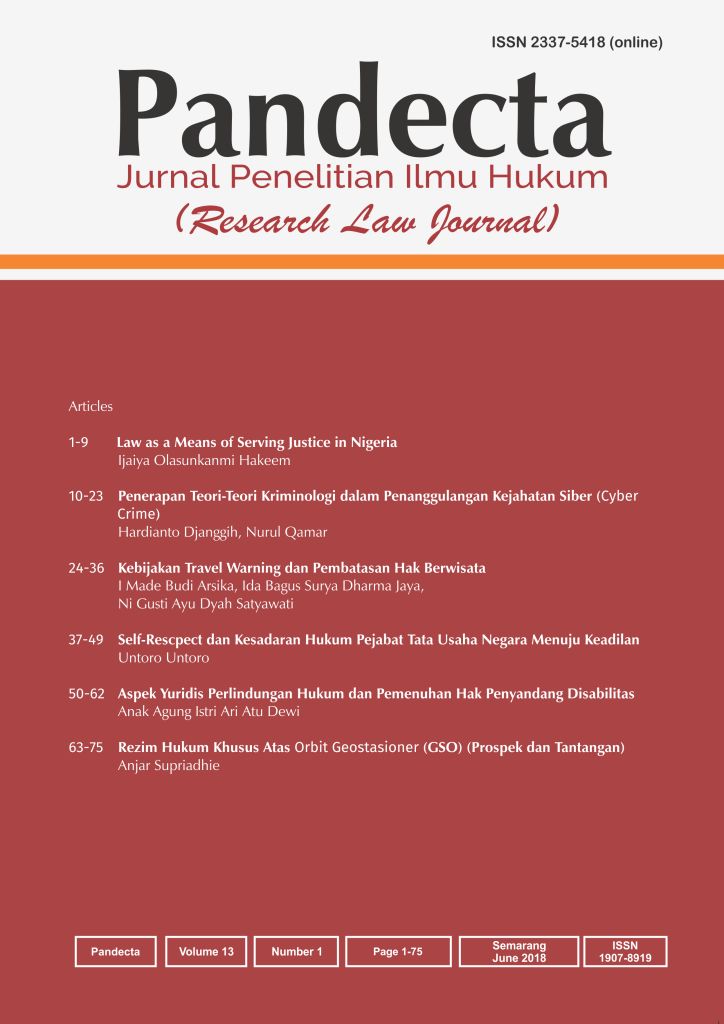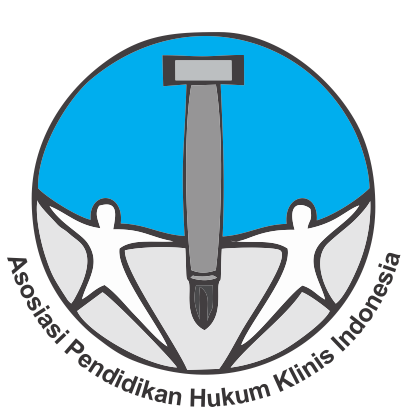Broaden The Authority of The Corruption Criminal Act Courts in Order to Eradicate Corruption, Colusion and Nepotism
(1) Branch of District State Attorney Office of Buol in Paleleh/Cabang Kejaksaan Negeri Buol di Paleleh
Abstract
Seriousness in eradicating KKN as a whole and not only focusing on eradicating corruption alone is in line with the regulations regarding collusion and nepotism in the Law on the Implementation of Clean and KKN-free Government. In the legislation, collusion and nepotism are formulated as criminal acts whose perpetrators are threatened with criminal sanctions. This means that collusion and nepotism are actions that are prohibited by the law. Indonesia has a Special Court to hear corruption cases, but these courts do not have the authority to try criminal acts of collusion and nepotism. The formulation of the problem raised in this paper is 1) What is the urgency of determining the court that is authorized to adjudicate criminal acts of collusion and nepotism? 2) What is the legal policy that should be related to the authority to adjudicate criminal acts of collusion and nepotism? The research method used `is normative legal research. The results of the study indicate that although juridically, the crime of collusion and nepotism should be tried in the general court, in this case the district court, in practice, the crime of nepotism has been tried and decided at the Corruption Court at the Class IA Bengkulu District Court in Decision Number 61/Pid. Sus-TPK/2016/PN.Bg. Therefore, it is necessary to clarify what court is authorized to adjudicate criminal acts of collusion and nepotism. The legal policy that related to the authority to adjudicate criminal acts of collusion and nepotism should be to expand as a step to strengthen the comprehensive eradication of KKN, if these steps are not taken, it is important to revoke the provisions for criminal acts of collusion and nepotism contained in the Law on the Implementation of Clean and KKN-free Government to ensure legal certainty .
Keywords
Full Text:
PDFReferences
Abdullah, Taufik. “Korupsi, Kolusi, Dan Nepotisme (KKN): Sebuah Pendekatan Kultural.” In Dalam Menyingkap Korupsi, Kolusi, Dan Nepotisme Di Indonesia. Yogyakarta: Aditya Media, 1999.
Admin. “Jampidsus Gelar Orientasi Satgassus P3TPK, Tentang Optimalisasi Penindakan Delik Kolusi Dan Nepotism.” Pji.Kejaksaan.Go.Id. Last modified 2020. Accessed September 18, 2021.
http://pji.kejaksaan.go.id/index.php/home/berita/1196.
Amin, Erham. Kedudukan Ahli Pidana Dalam Menentukan Korporasi Sebagai Subjek Hukum Dalam Kebakaran Hutan Lahan Basah. Borneo Development Project, 2020.
Antara. “Jampidsus Beberkan Sulitnya Penegakan Hukum Kasus Kolusi Dan Nepotisme.” Tempo.Co.
Ariyanti, Vivi. “Kebijakan Penegakan Hukum Dalam Sistem Peradilan Pidana Indonesia.” Jurnal Yuridis 6, no. 2 (2019): 33–54.
Daring, Kamus Besar Bahasa Indonesia. “Ke.Bi.Jak.An.” Kamus Besar Bahasa Indonesia (KBBI) Daring. https://kbbi.kemdikbud.go.id/entri/kebijakan .
———. “Ne.Po.Tis.Me.” Kamus Besar Bahasa Indonesia (KBBI) Daring. KBBI Daring, n.d. Accessed September 26, 2021. https://kbbi.kemdikbud.go.id/entri/nepotisme.
Djasmani, H. Yacob. “Hukum Sebagai Alat Rekayasa Sosial Dalam Praktek Berhukum Di Indonesia.” MMH 40, no. 3 (2011): 365–374.
Indonesia, Menteri Negara Koordinator Bidang Pengawasan Pembangunan dan Pendayagunaan Aparatur Negara Republik. “Pemberantasan Korupsi Kolusi Dan Nepotisme Dari Perekonomian Nasional,” n.d.
https://perpus.menpan.go.id/uploaded_files/temporary/DigitalCollection/ZmQ3YzI0MTM5YThhMjE2OGE3Nzc0YjgzNTZjZmEyMmY2OTUyMGZlOQ==.pdf.
Kenedi, John. Kebijakan Hukum Pidana Dalam Sistem Penegakan Hukum Indonesia. Bengkulu: Pustaka Pelajar, 2017.
Konstitusi, Mahkamah. Modul Pendidikan Negara Hukum Dan Demokrasi. Jakarta: Pusat Pendidikan Pancasila dan Konstitusi MK, 2016.
Muhtada, Dani, and Ayon Diniyanto. Dasar-Dasar Ilmu Negara. Semarang: BPFH Unnes, 2018.
Mulyadi, Lilik. “Pergeseran Perspektif Dan Praktik Dari Mahkamah Agung Republik Indonesia Mengenai Putusan Pemidanaan,” n.d. https://badilum.mahkamahagung.go.id/upload_file/img/article/doc/pergeseran_perspektif_dan_praktik_dari_mahkamah_agung_mengenai_putusan_pemidanaan.pdf.
Muntoha. Negara Hukum Indonesia Pasca Perubahan UUD 1945. Bantul: Kaukaba, 2013.
Rasyid, Usman, Fence M. Wantu, and Novendri M. Nggilu. Wajah Kekuasaan Kehakiman Indonesia: Analisis Yuridis Putusan Mahkamah Konstitusi Dan Putusan Mahkamah Agung Yang Bersifat A Contrario. Yogyakarta: UII Press, 2020.
Suparman, Eman. “Korupsi Yudisial (Judicial Corruption) Dan KKN Di Indonesia.” Padjajaran Jurnal 1, no. 2 (2014): 209–227.
Suparto. Negara Hukum, Demokrasi, Dan Kekuasaan Kehakiman. Jakarta: Bina Karya, 2019.
Toegarisman, M. Adi. Pemberantasan Korupsi Dalam Paradigma Efisiensi. Jakarta: PT Kompas Media Nusantara, 2016.
Widiastiani, Nindry Sulistya. “Kewenangan Mengadili Pengadilan Hubungan Industrial Dalam Perkara Direksi Melawan Perusahaan: Kajian Putusan Nomor 521 PK/Pdt/2017.” Jurnal Yudisial 12, no. 2 (2019): 179–196.
Yanggo, Huzaemah T. “Korupsi, Kolusi, Nepotisme Dan Suap (KKNS) Dalam Pandangan Hukum Islam.” Tahkim IX, no. 1 (2013): 1–20.
Refbacks
- There are currently no refbacks.


